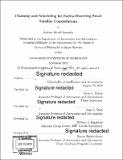Planning and scheduling for earth-observing small satellite constellations
Author(s)
Kennedy, Andrew Kitrell
DownloadFull printable version (25.82Mb)
Other Contributors
Massachusetts Institute of Technology. Department of Aeronautics and Astronautics.
Advisor
Kerri L. Cahoy.
Terms of use
Metadata
Show full item recordAbstract
The growth of Earth-observing small satellite constellations requires effective, automated operations management. State-of-the-art techniques must be improved to manage scheduling of observation data collection, data routing through a crosslinked constellation network, and maintenance of limited onboard resources, as well as to enable scaling to hundreds of satellites. This work has four primary contributions. The first is the development of a hierarchical smallsat constellation planning and scheduling system that addresses data routing and resource management. A centralized ground-based algorithm, the Global Planner, manages the whole constellation, while an onboard algorithm, the Local Planner, replans in real-time to handle urgent, unexpected observations. The second contribution is the development of the software infrastructure for simulating the constellation with high fidelity. The third is the analysis of system performance with a set of representative orbit geometries, ground station networks, and communications contexts. The fourth is the demonstration of routing of urgent observation data. The Global Planner algorithm demonstrates execution on larger problem sizes than the state-of-the-art, by quickly executing for both long planning horizons (requiring < 1 minute for a 1000 min. horizon) and many satellites (< 30 mins for 100 sats). Representative constellation geometries are simulated and analyzed with a 6U CubeSat bus model, including a 10-sat Sun-synchronous Orbit Ring and a 30-sat Walker Delta constellation. The improvement using crosslinks in addition to downlinks is assessed over a set of metrics including observation data throughput, latency of data delivery to ground, average Age of Information (freshness) of observation data, and freshness of TT&C data. In every case, performance is found to improve when using crosslinks and downlinks versus only using downlinks. Unplanned, urgent observation data is routed effectively by the Local Planner, achieving comparable latency performance with regular observation data (median of 42 minutes versus 38 mins) in a 6-sat simulation. This work enables efficient scheduling of operations for large, complex smallsat constellations. Future work is discussed that promises further scalability and schedule quality increases from the algorithm architecture presented.
Description
Thesis: Ph. D. in Space Systems, Massachusetts Institute of Technology, Department of Aeronautics and Astronautics, 2018. Cataloged from PDF version of thesis. Includes bibliographical references (pages 225-235).
Date issued
2018Department
Massachusetts Institute of Technology. Department of Aeronautics and AstronauticsPublisher
Massachusetts Institute of Technology
Keywords
Aeronautics and Astronautics.